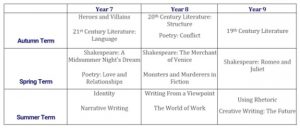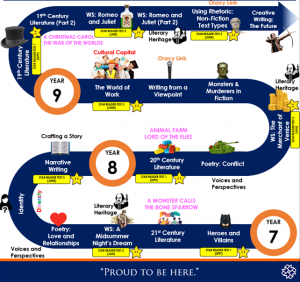The progressive curriculum journey we have created builds on the experiences of students at Key Stage 1 and 2. Students will be introduced to a variety of classical fiction as well as more modern fictional texts and a wide variety of poetry and non-fiction. A key part of the English curriculum at Murray Park is to introduce students to literature which takes them on a journey through different lives and cultures. It is a love of literature and learning which has influenced our curriculum plan which gives staff the opportunity to teach texts they are passionate about, whether this is in the format of studying a whole text or a short extract. A love and passion for reading is further embedded into our curriculum through weekly library lessons for Year 8 and Year 9 and fortnightly sessions for Years 9, 10 and 11.
Building on their learning from Key Stage 2, our students will deepen their understanding of writer’s craft and technical accuracy at Key Stage 3 in order to appreciate and emulate successful writing. This will then be regularly tested through both formative and summative assessment with students responding to the feedback they are given to bridge any gaps in knowledge and continually develop their skills.
As our students enter Key Stage 4, they will begin their GCSE journey through studying a mixture of modern and classic literature in preparation for their examinations. Students will study ‘The Strange Case of Dr Jekyll and Mr Hyde’ by Robert Louis Stevenson, Shakespeare’s ‘Macbeth’, ‘An Inspector Calls’ by J.B. Priestley and an anthology of ‘Power and Conflict’ poetry. The wider world will continue to be embedded within this curriculum through the study of extracts in preparation for the English Language examinations.
Key Stage 3
In English at Murray Park, students cover a wide range of inspiring topics all designed to promote high standards of language and literacy, whilst developing in them a love of literature and an appreciation of our rich and varied literary heritage, as well as focusing their attention on the reasons why writers write and the different contexts behind the texts being examined. From creative writing to Shakespeare to poetry to grammar, students are exposed to different texts, contexts, viewpoints and writers across the five years, starting with a Key Stage 3 curriculum that has been deliberately designed to work sequentially, with each year building on the skills and knowledge acquired each year.
The national curriculum for English at Key Stage 3 aims to ensure that students:
- Develop an appreciation and love of reading, increasingly engaging with challenging material
- Understand increasingly challenging texts, from novels to plays to poetry
- Read critically, being able to examine them in such ways as by analysing the language choices made or by comparing how different texts present ideas
- Write accurately, fluently, effectively and at length for pleasure and for information
- Plan and edit their work through considering who they are writing for and how they are using vocabulary, spelling and grammar effectively and accurately to achieve this
- Use Standard English confidently in their own writing and speech.
Our curriculum is designed with National Curriculum requirements embedded, but also with our students in mind. We aim to intrigue them and amaze them; we choose our topics very carefully so that students enjoy their learning and are also challenged. Instead of offering a ‘narrow curriculum’ that only caters to GCSEs, we strive to develop core skills in writing, reading and spoken language, promoting an increasing confidence in students with different types of text. We want students to understand the writer’s craft in both their reading and their language, relating ideas to a text’s context and understanding the influence of these factors. When studying a novel, we focus on plot, character and key themes.
When devising the English curriculum, we look to augment students’ spiritual, moral, social and cultural development: topics and texts are chosen with a view on developing these, with units titled ‘The World of Work’ and ‘Identity’, along with various novels such as ‘A Monster Calls,’ ‘Animal Farm’ and ‘The War of the Worlds’ offering thought-provoking themes and narratives. In addition, we are able to welcome visitors such as the Young Shakespeare Company and professional writers on a regular basis to build upon our work in school.
Every year seeks to build on the last; every topic seeks to develop but also recap skills learnt previously. From initially building on knowledge and skills taught at Key Stage 2, we seek to develop pupils’ linguistic knowledge, skills and understanding and offer opportunities for breadth and depth in reading and writing at Key Stage 3.
Curriculum Overview
Year 7
In Year 7, students examine a range of topics that mainly link to literary fiction and the linguistic devices used by writers. Students begin by looking at characterisation in the form of our ‘Heroes and Villains’ scheme of learning. Students then read either ‘A Monster Calls’ by Patrick Ness or ‘The Bone Sparrow’ by Zana Fraillon as challenging novels, carefully selected to fully engage their classes as texts from the 21st Century. As well as reading the novels critically together as a class, students specifically examine how writers use linguistic devices to shape meaning and affect their reader. They are then introduced to the works of Shakespeare with a focus on ‘A Midsummer Night’s Dream’ before looking at poetry with a thematic strand of ‘Love and Relationships’. Towards the end of the year, Year 7 read and compare several texts around the theme of ‘Identity’ in order to make them consider who exactly they are and how they see the world, appreciating the diverse nature of our society and celebrating our differences. The year is completed by examining authorial intent in the ‘Narrative Writing’ topic, where students consider how to approach story writing and building a sense of journey in a narrative.
Every week, Year 7 students also visit the library to have a reading lesson: the school has invested heavily in the Accelerated Reader scheme, designed to promote reading for pleasure and help students to do so.
Year 8
In Year 8, students build on their prior knowledge to study a wide variety of fiction and non-fiction texts, with a more specific focus on the structural intent of the writer in addition to the linguistic analysis of Year 7. Students will start the year by enjoying a classic novel from the 20th Century (moving from the 21st Century in Year 7), analysing how the writer has structured the text to interest us as readers. Students either study ‘Animal Farm’ by George Orwell or ‘Lord of the Flies’ by William Golding, chosen for their engaging plots and differing structural choices as well as their literary value. Having focused more specifically on the language of poetry in Year 7, students in Year 8 move onto analysing poetry that is centred around a theme of ‘Conflict’ and analysing the structural choices. Following this, students will study ‘The Merchant of Venice’, a play which focuses on religion and the cultural differences in society before looking at the gothic genre while studying ‘Monsters and Murderers’, a scheme of learning which embeds key skills through analysing both fiction and non-fiction. Towards the end of the year, students consolidate their understanding of how they write their own views and develop a persuasive argument in the unit titled ‘Writing from a Viewpoint’. This non-fiction focus continues in the form of our ‘World of Work’ topic, designed to expose them to a range of future possibilities by learning from the past and the present and broadening the cultural capital of our students.
Our Accelerated Reader scheme also continues for Year 8 students, continuing to help students to read texts suitable for their reading age for pleasure, with staff ready to listen to them read to ensure fluidity and comprehension.
Year 9
In Year 9, the department of English look to raise the level of challenge compared to previous years. Sequentially, students take the specific focus areas of previous years and begin to look at texts in more depth by analysing language and structure simultaneously. Students start the year with studying a 19th Century novel for an entire term by either studying ‘A Christmas Carol’ by Charles Dickens or H.G. Wells’ ‘The War of the Worlds,’ ensuring that students are exposed to a higher level of challenge in language and starting to explore writers’ intended messages and meanings. Students then move onto examining ‘Romeo and Juliet’ by William Shakespeare – the first tragedy play that students look at in KS3. Year 9 then begins to focus on the creative side of writing with the unit ‘Using Rhetoric,’ a half-term that is dedicated to writing persuasively in a variety of styles including letters, articles and speeches. In this unit, students are given the opportunity to write to anyone in the UK with a free posted letter – in recent previous years, students have received responses from the likes of David Attenborough, J.K. Rowling, David Walliams, Tottenham Hotspurs Football Club and even the Queen! To end KS3, students imagine both a utopian and dystopian future with a creative writing scheme of learning, drawing on extracts from texts such as ‘The Hunger Games,’ ‘The Handmaid’s Tale’ and ‘1984’ to inspire pieces based on dystopian worlds.
Our Accelerated Reader scheme also continues for Year 9 students, with reading ages tracked and intervention put into place where students have reading ages significantly below expectations.
Literacy
Everything that students do in English at Key Stage 3 is designed to develop their core skills in reading, writing and speaking and listening. From their Accelerated Reader lessons that test and then seek to progress reading ages, to formative Whole Class Feedback tasks and Summative Assessments that always include marks given for technical accuracy, students are constantly asked to focus on how literate they are and how they could advance this. This is in addition to the focus we give ‘literacy errors’ when giving feedback: spellings, punctuation and grammar. We want all students to be able to communicate their ideas in the most effective ways possible.
Extra-Curricular Activities
Every day, our full-time librarian Mrs Makasis runs a variety of activities in the library. From meditation to games to exploring new books with students, inspiration can be found every lunchtime.
During form time, intervention sessions take place, mainly for Year 10 and 11 students. The intention of these is to revise and recap GCSE English Literature content, as well as developing their skills in creating revision materials. Revision sessions take place after school also: ‘Commit to Six’ is primarily aimed at Year 11 students and offers students the opportunity to recap and expand on their knowledge of the skills and content covered in their GCSE examinations. Once each term, ‘Twilight’ intervention sessions are offered, where students work intensively on their English studies until around 7pm.
60 Students will also be visiting Regent Theatre in Stoke-on-Trent to watch the play ‘An Inspector Calls’ by J.B. Priestley. This is a wonderful opportunity for students to experience going to the theatre as part of their cultural development, as well as gaining a knowledge about how a GCSE text functions specifically as a play. Other visits are frequently being planned throughout the year and details will be released to the relevant year groups as and when these opportunities become available.



